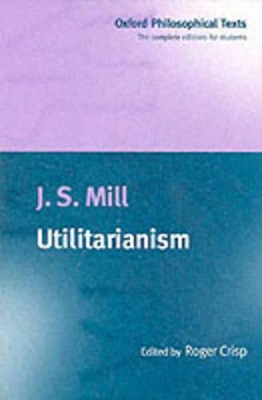Oxford Philosophical Texts
1 total work
The Oxford Philosophical Texts series consists of authoritative teaching editions of canonical texts in the history of philosophy from the ancient world down to modern times. Each volume provides a clear, well laid out text together with a comprehensive introduction by a leading specialist, providing the student with detailed critical guidance on the intellectual context of the work and the structure and philosophical importance of the main arguments. Endnotes are
supplied which provide further commentary on the arguments and explain unfamiliar references and terminology, and a full bibliography and index are also included.
The series aims to build up a definitive corpus of key texts in the Western philosophical tradition, which will form a reliable and enduring resource for students and teachers alike.
John Stuart Mill's Utilitarianism is one of the most important, controversial, and suggestive works of moral philosophy ever written. Mill defends the view that all human action should produce the greatest happiness overall, and that happiness itself is to be understood as consisting in higher and lower pleasures.
This volume uses the 1871 edition of the text, the last to be published in Mill's lifetime. The text is preceded by a comprehensive introduction assessing Mill's philosophy and the alternatives to utilitarianism, and discussing some of the specific issues Mill raises in Utilitarianism. This volume also includes an analysis of the text, substantial endnotes, suggestions for further reading, and a full bibliography.
supplied which provide further commentary on the arguments and explain unfamiliar references and terminology, and a full bibliography and index are also included.
The series aims to build up a definitive corpus of key texts in the Western philosophical tradition, which will form a reliable and enduring resource for students and teachers alike.
John Stuart Mill's Utilitarianism is one of the most important, controversial, and suggestive works of moral philosophy ever written. Mill defends the view that all human action should produce the greatest happiness overall, and that happiness itself is to be understood as consisting in higher and lower pleasures.
This volume uses the 1871 edition of the text, the last to be published in Mill's lifetime. The text is preceded by a comprehensive introduction assessing Mill's philosophy and the alternatives to utilitarianism, and discussing some of the specific issues Mill raises in Utilitarianism. This volume also includes an analysis of the text, substantial endnotes, suggestions for further reading, and a full bibliography.
